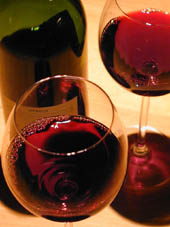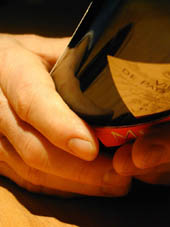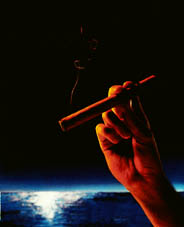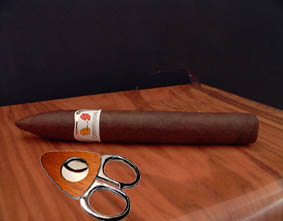Tasters
are employed at every stage in the wine industry to gauge, compare and
evaluate the various blends. |
||
We will now compare wine- and cigar-tasting to highlight the origin and consequences of the fundamental differences between the two fields. |
|
|
WINE TASTING |
|
|
Putting all the senses to work: 1. The wine-taster examines the wine's robe, noting its colour, transparency, depth and richness. 2. The wine-taster then smells the vapours given off by the wine and records a first series of olfactory sensations. |
||
|
|
3. The
wine-taster finally takes a mouthful; he gently swills it round his
mouth and mixes it with air to release all the smell and taste of the
wine. - Tasting is not the same as drinking Once tasting is complete, the wine-taster will offend nobody by spitting out the wine to avoid the effects of the alcohol. |
CIGAR TASTING |
|
|
Olfactory pleasure and feelings of well-being: Cigar smoke contains aromatic and taste constituents; it also contains substances that irritate but are diluted by the presence of water vapour (incidentally, one of the reasons for humidifying cigars). Then there is the nicotine which acts on the nervous system. This side-effect creates a feeling of well-being that greatly increases the cigar-lover's pleasure. The effects of nicotine are not immediate but are certain to be felt. Another reason why cigar-tasting cannot be an instantaneous process. From one end of the cigar to the other: Cigar smoke is far from being uniform. Cigar-tasting is therefore a series of evaluations which have to be taken overall to give a final judgement. This first major difference from wine-tasting has a corollary: |
||
|
|
Cigar-tasting is the same as smoking: A cigar-taster will absorb nicotine through the walls of the mouth. There is no need to inhale; indeed it is a mistake to inhale as this can do nothing except irritate the bronchi. The absorption of nicotine causes a feeling of slight euphoria and continues throughout the tasting until a feeling of satisfaction is reached. Although this feeling depends on the quantity smoked, it also depends on the individual smoker. |
|
Once the smoker reaches this stage, the cigar is abandoned. Cigar-tasting therefore means smoking the cigar and smoking takes time; depending on the type of cigar the entire session may last fifteen minutes or more than an hour |
||
|
|
|
Gilbert Belaubre: "Initiation to mastery" |
||



